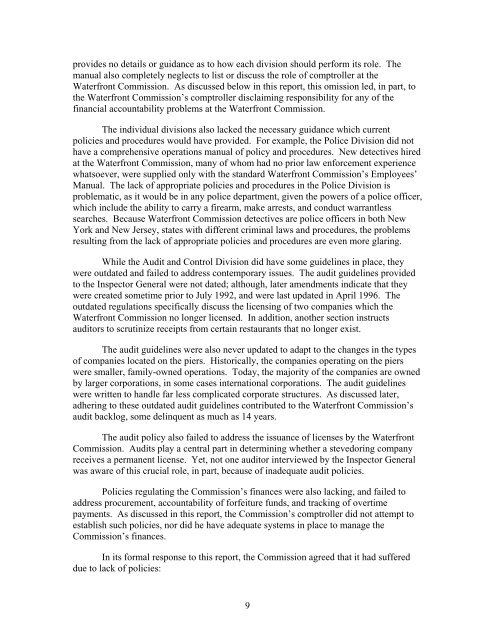Investigation of the Waterfront Commission of New York Harbor
Investigation of the Waterfront Commission of New York Harbor
Investigation of the Waterfront Commission of New York Harbor
Create successful ePaper yourself
Turn your PDF publications into a flip-book with our unique Google optimized e-Paper software.
provides no details or guidance as to how each division should perform its role. Themanual also completely neglects to list or discuss <strong>the</strong> role <strong>of</strong> comptroller at <strong>the</strong><strong>Waterfront</strong> <strong>Commission</strong>. As discussed below in this report, this omission led, in part, to<strong>the</strong> <strong>Waterfront</strong> <strong>Commission</strong>’s comptroller disclaiming responsibility for any <strong>of</strong> <strong>the</strong>financial accountability problems at <strong>the</strong> <strong>Waterfront</strong> <strong>Commission</strong>.The individual divisions also lacked <strong>the</strong> necessary guidance which currentpolicies and procedures would have provided. For example, <strong>the</strong> Police Division did nothave a comprehensive operations manual <strong>of</strong> policy and procedures. <strong>New</strong> detectives hiredat <strong>the</strong> <strong>Waterfront</strong> <strong>Commission</strong>, many <strong>of</strong> whom had no prior law enforcement experiencewhatsoever, were supplied only with <strong>the</strong> standard <strong>Waterfront</strong> <strong>Commission</strong>’s Employees’Manual. The lack <strong>of</strong> appropriate policies and procedures in <strong>the</strong> Police Division isproblematic, as it would be in any police department, given <strong>the</strong> powers <strong>of</strong> a police <strong>of</strong>ficer,which include <strong>the</strong> ability to carry a firearm, make arrests, and conduct warrantlesssearches. Because <strong>Waterfront</strong> <strong>Commission</strong> detectives are police <strong>of</strong>ficers in both <strong>New</strong><strong>York</strong> and <strong>New</strong> Jersey, states with different criminal laws and procedures, <strong>the</strong> problemsresulting from <strong>the</strong> lack <strong>of</strong> appropriate policies and procedures are even more glaring.While <strong>the</strong> Audit and Control Division did have some guidelines in place, <strong>the</strong>ywere outdated and failed to address contemporary issues. The audit guidelines providedto <strong>the</strong> Inspector General were not dated; although, later amendments indicate that <strong>the</strong>ywere created sometime prior to July 1992, and were last updated in April 1996. Theoutdated regulations specifically discuss <strong>the</strong> licensing <strong>of</strong> two companies which <strong>the</strong><strong>Waterfront</strong> <strong>Commission</strong> no longer licensed. In addition, ano<strong>the</strong>r section instructsauditors to scrutinize receipts from certain restaurants that no longer exist.The audit guidelines were also never updated to adapt to <strong>the</strong> changes in <strong>the</strong> types<strong>of</strong> companies located on <strong>the</strong> piers. Historically, <strong>the</strong> companies operating on <strong>the</strong> pierswere smaller, family-owned operations. Today, <strong>the</strong> majority <strong>of</strong> <strong>the</strong> companies are ownedby larger corporations, in some cases international corporations. The audit guidelineswere written to handle far less complicated corporate structures. As discussed later,adhering to <strong>the</strong>se outdated audit guidelines contributed to <strong>the</strong> <strong>Waterfront</strong> <strong>Commission</strong>’saudit backlog, some delinquent as much as 14 years.The audit policy also failed to address <strong>the</strong> issuance <strong>of</strong> licenses by <strong>the</strong> <strong>Waterfront</strong><strong>Commission</strong>. Audits play a central part in determining whe<strong>the</strong>r a stevedoring companyreceives a permanent license. Yet, not one auditor interviewed by <strong>the</strong> Inspector Generalwas aware <strong>of</strong> this crucial role, in part, because <strong>of</strong> inadequate audit policies.Policies regulating <strong>the</strong> <strong>Commission</strong>’s finances were also lacking, and failed toaddress procurement, accountability <strong>of</strong> forfeiture funds, and tracking <strong>of</strong> overtimepayments. As discussed in this report, <strong>the</strong> <strong>Commission</strong>’s comptroller did not attempt toestablish such policies, nor did he have adequate systems in place to manage <strong>the</strong><strong>Commission</strong>’s finances.In its formal response to this report, <strong>the</strong> <strong>Commission</strong> agreed that it had suffereddue to lack <strong>of</strong> policies:9


